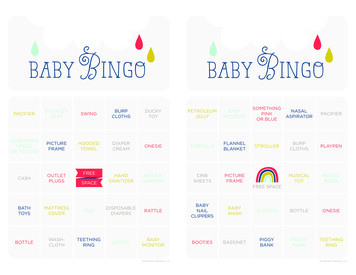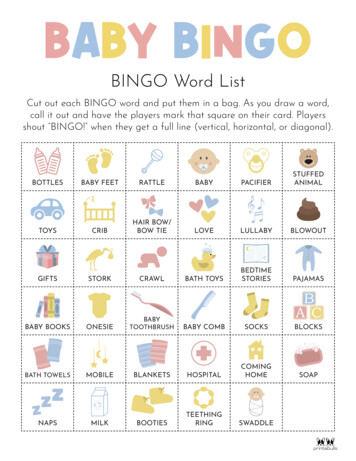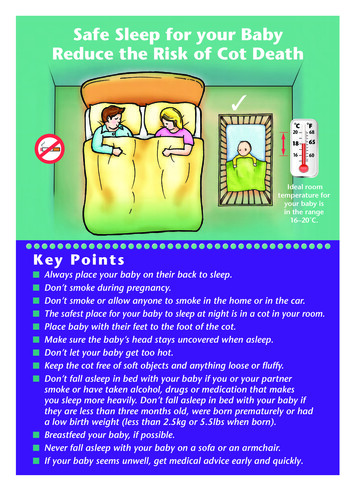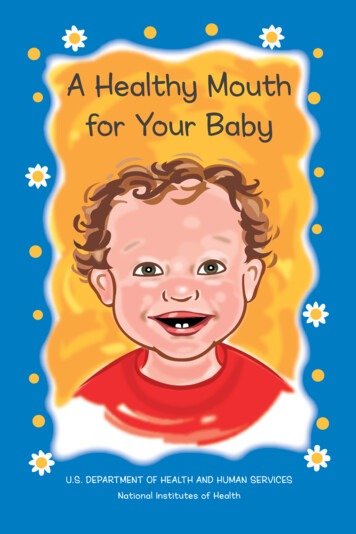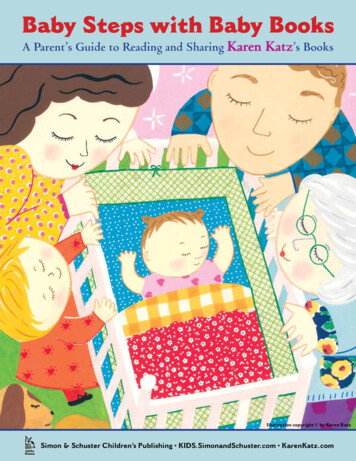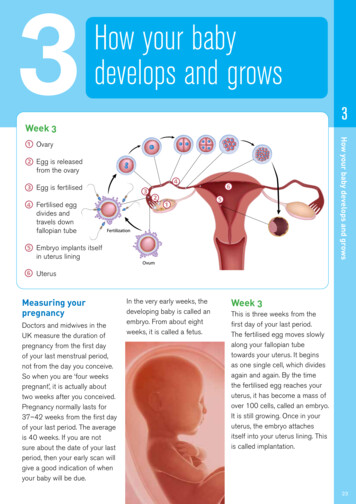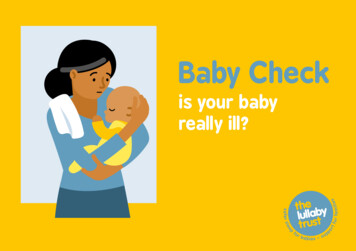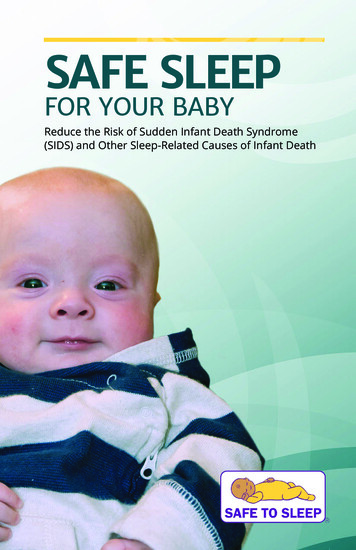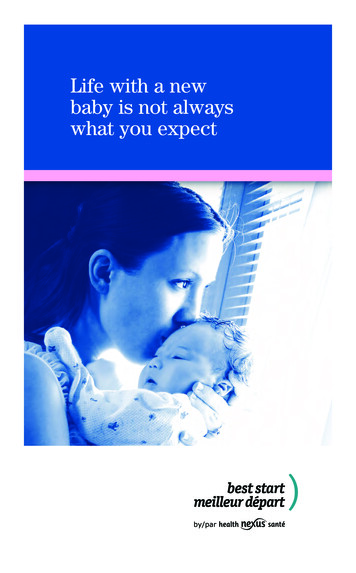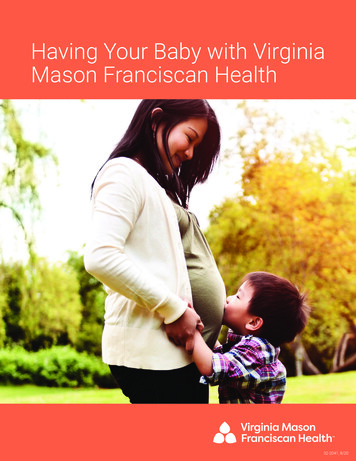
Transcription
Having Your Baby with VirginiaMason Franciscan HealthMaternity Health Guide 132-2041, 8/20
CONGRATULATIONS ONYOUR PREGNANCY!Use this guide to help you prepare for your birth with Virginia MasonFranciscan Health. Let’s get started with the basics:My name:My due date:My partner’s name and phone number:My provider’s name and phone number:My baby’s health care provider’s name and phone number:NOTESMaternity Health Guide 2
Choosing a ProviderThe type of provider you choose depends on manyfactors including: your age, health and preexistingconditions, as well as your hopes for labor and delivery.Once you determine the type of provider you want, you’llbe able to choose the individual caregiver with whomyou feel comfortable and confident.OB/GYNSOB/GYNs can help you through pregnancy, childbirthand gynecological services through the rest ofyour life. Women who have had complications withearlier pregnancies, are expecting multiples or havea preexisting medical condition. Many women withlow-risk pregnancies also choose OB/GYNs for theirprenatal, labor and delivery care.MIDWIFERY SERVICESOur highly trained team of certified nurse midwives(CNMs) provide exceptional care for both motherand baby, from prenatal care through delivery andgynecological services through the rest of your life.Midwives provide a more holistic and traditionalapproach to childbirth, and are often trained in naturalpain management techniques and birthing methods.You don’t need to deliver at the Midwifery Center atSt. Joseph to enlist a midwife as your provider. Ourmidwives work in partnership with OB/GYNs and ifspecialty medical treatment or surgery is needed,you will receive care from a specialist. However,your midwife will continue to manage your care incollaboration with these specialists. Midwives can alsocare for women who desire to have a trial of labor aftercesarean (TOLAC).FAMILY MEDICINEA Family Medicine doctor can provide care for yourwhole family, and some Family Medicine physiciansalso provide Obstetrical and Newborn care. Theirknowledge of your family and health history allow themto provide Prenatal and Obstetrical care that is verypersonalized — along with the ability to care for babyafter he or she is born.CENTERINGPREGNANCY You don’t have to prepare for pregnancy on your own.Virginia Mason Franciscan Health offers a uniqueexperience of group-based prenatal care includingcheckups, conversation and valuable information. YourCenteringPregnancy meetings will take the place ofyour regular prenatal check-ups and allow you to bondwith a cohort of pregnant women with similar duedates. If you choose CenteringPregnancy you shouldstill consider taking a childbirth education class to befully prepared for your child’s birth.Maternity Health Guide 3
Prenatal Do’s and Don’tsThe first best thing you can dofor your baby is to practice goodprenatal care. This starts withregular prenatal appointments, butencompasses many choices youmake throughout your pregnancy.Your caregiver will provide you withguidelines for a healthy pregnancy,but here’s a start on what to do—and what not to do—when you’reexpecting.DO take prenatal vitamins.The American Congress ofObstetricians and Gynecologistsrecommends that all pregnantwomen take 600 micrograms offolic acid and 27 milligrams of irondaily. Eating folate and iron richfoods may be enough, but manywomen take a prenatal supplementto ensure they get enough. Prenatalsupplements contain many othervitamins and minerals, so youshould talk to your doctor aboutthe right ones for you.DON’T smoke cigarettes,use tobacco, drink alcoholor use drugs, including marijuana,all of which can cause seriousbirth defects. Ask your partner tosupport you by following healthypractices, too.DO maintain a healthy diet.Incorporate plenty of fruits,vegetables and whole grains.Opt for lean sources of protein,including meat, poultry, beans,eggs, soy products, nuts andseeds, and low-fat dairy productswhen possible. You may alsoneed to increase your calciumconsumption.DON’T lose sleep. Try tosleep seven to nine hoursevery night.DO exercise. Most expertsrecommend maintainingyour pre-pregnancy exercise level,preferably at least 30 minutes aday most days of the week. If youdon’t have an exercise routine, trygentle, nonweight-bearing exerciselike swimming or riding a stationarybike. Walking and modified yoga orPilates are also safe and healthyoptions. Talk to your doctor aboutcontinuing any higher-impactpre-pregnancy activities.DON’T neglect healthproblems. Diabetes and highblood pressure can complicate apregnancy, but your doctor can helpyou manage them.DO talk to the women inyour family about theirpregnancies. They are the bestresources and may alert you torisks and potential problems, andsuggest ways to deal with commonpregnancy discomforts.DON’T use hot tubs orsaunas. Studies have shownthat exposure to high heat duringthe first trimester can cause birthdefects, according to the AmericanAcademy of Family Physicians.DO drink lots of water tocombat common problemslike dehydration and constipation,and to help your body keep pacewith increases in blood volume.DON’T eat certain foods.Some foods can add toyour discomfort and may actuallyharm you and your baby. Caffeinecan cause irritability, insomnia,nervousness and dehydration inCONTINUEDMaternity Health Guide 4
the mother, and low birth weightin the baby. You may also want tosteer clear of raw fish, fish high inmercury, undercooked meat andsoft cheeses.DON’T change thecat box. Cat feces cancontain a parasite that leads totoxoplasmosis, which can causebirth defects in unborn children.Toxoplasmosis may also be foundin dirt contaminated by cat feces,so wear gloves when gardening.DO watch your weight.Women near their idealweight should gain an averageof 25 to 30 pounds duringpregnancy. Underweight womenmay need to gain more, whileoverweight women may be advisedto gain less. Pregnancy is notthe time to diet. The AmericanAcademy of Family Physicianssuggests gaining two to threepounds during the first 12 weeks,then one pound per week after that.DON’T expose yourselfto toxic substances, suchas cleaning solvents, lead andmercury, some insecticides andpaint. Read labels on householdproducts, which warn you if theyare harmful to pregnant women.And last but not least DO make sure to attendyour scheduled prenatal checkups and followyour prenatal care provider’s advice.High-RiskPregnancyThe name might give youpause, but there’s no need toworry. “High-risk” is simply thedesignation for pregnanciesthat carry an increased risk ofcomplications due to a varietyof circumstances, such as: Age of the mother Mother has a chronic medicalcondition Growth abnormalities inthe baby Previous premature birth Multiple gestations (twins,triplets, etc.)Our maternal-fetalmedicine teamof perinatologists arePAUSEand ReflectWhat other questions or concerns do you have about being pregnant?Jot them down here for your next appointment.specially trained in highrisk pregnancy care.They collaborate withyour provider ifcomplications ariseduring your pregnancy.Maternity Health Guide 5
Family Education ClassesWe are truly committed to helping you and your familyprepare for baby through a wide variety of prenataland parenting classes. The more informed you are,the better prepared you’ll be, and that increases yourchances of having the birth and newborn experienceyou’ve always hoped for.CHILDBIRTH PREPARATIONPrepare for labor and delivery. This classincludes labor coping techniques, phasesand stages of labor, cesarean birth, medication options,newborn care and more.TOOLS TO BUILD A BETTER BIRTHThis class is taught by trained andexperienced childbirth educators and doulas.This class offers hands-on practice of techniques,strategies and tools to increase comfort during laborand birth. You will find this class beneficial even if youare planning to use medications in labor. Class focus ison practical skills that everyone can use.CHILDBIRTH PREPARATION ONLINEE-CLASSIdeal for the busy 21st century parent, orwomen on bed rest, this class is well-suited for familieswith limited flexibility to attend classes in-person.Content includes instructive videos, interactive activitiesand access to handouts.ESPECIALLY YOURSThis is a personalized three-hour privatechildbirth education course for the expectantmother and her companion. Registered studentspersonally select class content after arranging thedate, time and location that best suits their schedule.A private tour of a Franciscan Family Birth Center isan option.WATERBIRTH BASICSThis free online class is required for patientsinterested in delivering in water at St. JosephMedical Center or the Midwifery Birth Center atSt. Joseph and St. Elizabeth Hospital in Enumclaw.Before registering, interested participants shoulddiscuss their intention with their health care providerto determine if they are a good candidate. Please notethat this class should be completed before 36 weeksof pregnancy.For complete details and to registerfor classes, please visit our website atchifranciscan.org/familyeducationMaternity Health Guide 6
CenteringPregnancy You have a unique choice for prenatal care through CHI Franciscan. Ourgroup-visit prenatal care program, CenteringPregnancy , offers the threemajor elements of prenatal care in a group setting: Instead of one-to-oneprenatal visits, you can get your prenatal care, plus helpful informationand peer support, through CenteringPregnancy.The program, which started at Franciscan Women’s Health Associatesat St. Joseph, received accreditation by the international CenteringHealthcare Institute in 2016. It’s also proven to decrease preterm deliveryand postpartum depression.CenteringPregnancy has a high patient satisfaction rate, and participantsare generally more engaged, better informed and ask their providers morein-depth questions about their pregnancy. As you bond with other momsand parents, you’ll benefit from the support of your group members andeven create a support system for postnatal support, which is justas important as prenatal support.Is CenteringPregnancy for Me?Whether this is your first or fourth pregnancy, if you’re interested inconnecting with other expectant moms, CenteringPregnancy is for you.Here’s how it works: 8 to 12 pregnant women with similar due dates participate in a groupdiscussion, starting around 12 to 16 weeks, led by a CHI FranciscanCertified Nurse Midwife (CNM) or Obstetrician (OB). Other clinicians and educators share helpful resources to use duringand after pregnancy. Your spouse and/or partner are welcome. Each group meets for 10, 90-minute sessions throughout your pregnancyand in the weeks after delivery. Sessions are typically covered by private health insurance andMedicaid, avoiding out-of-pocket costs.PAUSEand PlanWrite the date/s of your class here.CenteringPregnancy group visits take the place of your regular one-on-oneprenatal visits. You will receive blood pressure and belly checks, alongwith other health assessments, as appropriate.Maternity Health Guide 7
Your Birth PlanA birth plan is a simple,straightforward statement of yourpreferences and wishes for thechildbirth experience. When thebig day arrives and you’re busywith bringing baby into the world,your intentions will already be setin writing for your caregivers andhelpers, so you can focus on whatmatters: a healthy, successful birth.These are some of the factorsyou will want to consider whenpreparing your birth plan:During the first moments after mybaby is born, my caregivers canbest support me by:I want my caregivers to know aboutwhat’s important to me and whatI might need: (Examples: familytraditions, dietary preferences orrestrictions, religious or spiritual needs)What are your hopes when youenvision your childbirth experience?PAIN RELIEFOf the various comfort therapiesavailable to help with my painthroughout labor, I plan to use(check any that apply):musicepiduralposition changeswalkingJacuzzishowerheat and coldice chipsmassagebirth balllocal anesthesiasquattingnarcotic analgesicsothernitrous oxidepatterned breathingWhat are your concerns?OTHER CONSIDERATIONSI have these cesarean sectionpreferences:HOPES AND EXPECTATIONSWho will be the primary supportperson in the room?Will any others be present (e.g.,siblings, doula, parent, friend)?I wish to explore a vaginal birth aftercesarean section (VBAC) option:I would like to avoid or repeat theseexperiences from the past times Igave birth (if applicable):YesNoIf there are any questions youare unprepared to answer, theseare good points of conversationfor your primary care provider orCenteringPregnancy group.Maternity Health Guide 8
“What to Bring”ChecklistIt can be fun to pack in advance for your trip to the hospital for baby’sbirth—just imagine the next time you open the bag, your little one will be onthe way. You don’t need to bring much—but there are some essentials.FOR YOUHealth insurance cardPreregistration formsClothesto labor in–comfortable clothes that are easy to adjust orremove Pajamas and slippers–a buttonup top if you plan to breastfeed Socks–some prefer no-slipsocks for added safety Treats–breath mints, lollipopsor hard candies can help withdry mouth and keep you feelingfresh during a long labor Toiletries–toothbrush,toothpaste, deodorant, lip balm,hairbrush, shampoo, soap,lotion, glasses or contacts, hairties, barrettes or a headband Nursing bra and/or breastpads–a nursing bra willaccommodate swollen breastswhen your milk comes in, andbreast pads absorb leaking milk Sports bra (can be useful forlaboring in water or to suppresslactation if you choose notto nurse) Nursing pillow anitary pads–your birth centerSwill provide these, but you mayhave a favorite brand. Choosepads designed for a heavier flow. oing-home clothes–chooseGcomfortable clothing. You willstill likely need maternity wear,but something that fit you atabout six months willbe appropriateFOR BABY Infant car seat and infant headsupport–make sure you bringinstallation instructions. ewborn-sized going-homeNoutfit at, booties and mittens.HMittens keep baby fromscratching his or her face iffingernails are long.PAUSEand PlanThe person who is standing byto transport me to the hospitalwhen I go into labor is:My other children will be caredfor by when I goto the hospital (if applicable).My other children will bepresent for the birth:YesNoI have transportation arrangedfor the morning that I amdischarged to go home:YesNoI have a car seat purchasedand installed, ready to transportmy baby home:YesNoIf there is an unexpectedoutcome or emergency, thesepeople should be contacted(include phone numbers): Receiving blankets–for swaddling ewborn-sized diapers andNbaby wipesI rely on this person foremotional and/or spiritualsupport (include phone number): Burp clothsMaternity Health Guide 9
Choosing aBirth CenterWhether you choose one of our Family BirthCenters or the Midwifery Birth Center atSt. Joseph for your baby’s birth, you’ll haveaccess to the high-quality care of one of theregion’s largest health care providers. Thisquality of care combined with personalizedsupport has earned our Family Birth Centersa Designated Blue Distinction Center forMaternity from Premera Blue Cross and aBaby-Friendly Hospital designation fromBaby-Friendly USA. As designated BabyFriendly hospitals, St. Joseph MedicalCenter and St. Michael Medical Center arerecognized for demonstrating optimal careand support for breastfeeding mothers andtheir babies.We’ve evolved and expanded our birthingfacilities and options to allow mothers andfamilies to make the right choice for theirchildbirth experience. Wherever you chooseto go, your experience will be designedaround your needs and comforts, and baby’ssafe passage into the world.When You NeedSpecialized CareCesarean section. If a vaginal birth is not possible, ourobstetricians may perform perform a C-section, a safe surgeryfor delivery. Your support person is usually present.Vaginal birth after cesarean (VBAC). Our skilled providersoffer VBAC for women who have previously given birth byC-section. Ask your obstetrician or midwife about VBAC.Special Care Nursery and Neonatal Intensive Care Unit (NICU).Babies born prematurely, critically ill or with special medicalneeds, will have access to our Special Care Nurseries andNICU. Our special care nurseries accommodate newbornsborn as early as 34 weeks’ gestation and are located atSt. Francis Hospital, St. Anne Hospital and St. Michael MedicalCenter-Silverdale. Our NICU at St. Joseph Medical Centercares for newborns as early as 25 weeks’ gestation.Affiliation with Seattle Children’s Hospital. Our FamilyBirth Centers work in collaboration with Seattle Children’sneonatology experts who provide 24/7, round-the-clock carefor premature and critically ill infants.Maternity Health Guide 10
Welcome,Baby!AFTER BABY IS BORNPostpartum Care. You’ll be wellcared for by specially trainednurses who will monitor you closelyto make sure you’re recovering andnot experiencing complications.GOING HOMEMany people call the first threemonths of baby’s life the “fourthtrimester.” This means both youand baby will need ongoing careand support.Baby’s First Exam! Your baby willbe given an APGAR test—a quicktest performed at one and fiveminutes after birth. The scoredetermines how well the babytolerated the birthing process,measuring breathing effort,heart rate, muscle tone, grimaceresponse and skin color.Follow-up Care. After the baby isborn, the next visit should be twoor three days after bringing thebaby home (for breastfed babies)or when the baby is 2-4 days old(for all babies discharged froma hospital before 2 days old).For experienced parents, somepractitioners will delay the visituntil baby is 1-2 weeks of age.Vitamin K Injection. Newbornsreceive vitamin K injectionsto prevent the possibility ofhemorrhage (particularly in thebrain) just after delivery. This isa rare condition, but dangerousenough to warrant precaution.Hepatitis B Vaccine, The hepatitis Bvaccine is given to children as aseries of three injections, with thefirst given to infants before leavingthe hospital, the second between1 and 2 months of age and the thirdat 6 months of age.Other Tests. We’ll check baby’shearing; screen for congenitalheart defects; and look fordevelopmental, genetic andmetabolic disorders.Postpartum Support. Whetheryou’re a new or experienced mom,adding a new family memberis a big adjustment. Add to thatfluctuating hormones and an upsetsleep schedule, and you might findyourself in need of support. OurBalance after Birth program is adrop-in support group, and is awelcoming, nonjudgmental spacefor new parents to talk about theemotional changes and challengesof parenthood. Come find support,friendship and fresh ideas for yourparenting journey.BreastfeedingSupportEXPERIENCED LACTATIONCONSULTANTSBreastfeeding is natural, but itdoesn’t always come naturally.Sometimes you and baby needa little help. Our nurses andeducators—most of whom areInternational Board-CertifiedLactation Consultants—provideexperienced support with acompassionate touch.While you’re still in the hospital,our Lactation Consultants canhelp you and baby learn theropes. Our inpatient servicesare available at: St. Joseph Medical Centerin Tacoma St. Francis Hospitalin Federal Way St. Michael Medical Centerin Silverdale St. Anne Hospital in BurienOnce you return home, weoffer outpatient breastfeedingconsultations at: St. Joseph Medical Pavilionin Tacoma St. Francis Medical Pavillionin Federal Way Franciscan Medical Pavilion –Highline in Burien St. Elizabeth Hospitalin Enumclaw St. Michael Medical Centerin SilverdaleMaternity Health Guide 11
Silverdale 41BurienFederal Way35 6Tacoma2BIRTH CENTERLOCATIONSEnumclawBurien: St. Anne HospitalEnumclaw: St. Elizabeth HospitalFederal Way: St. Francis HospitalSilverdale: St. Michael Medical CenterTacoma: St. Joseph Medical CenterTacoma: Midwifery Birth Center at St. JosephTake a Virtual Tour.Maternity Health Guide 12
Virginia Mason Franciscan Health offers a unique experience of group-based prenatal care including checkups, conversation and valuable information. Your . Sessions are typically covered by private health insurance and Medicaid, avoiding out-of-pocket costs. CenteringPregnancy group visits take the place of your regular one-on-one
